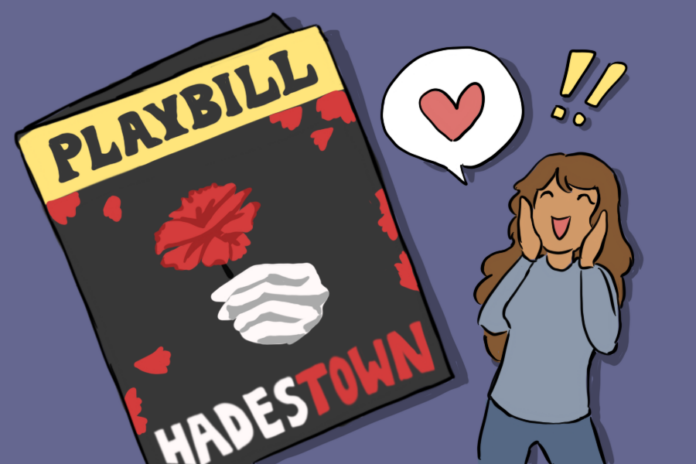The beautiful meaning behind this musical’s interpretation of a beloved Greek myth
By SABRINA FIGUEROA — sfigueroaavila@ucdavis.edu
The ancient myth of Orpheus and Eurydice is a popular tale in Greek mythology. It is also, perhaps, one of the most tragic and poignant; so much so that it gives Shakespeare a run for his money.
Every retelling of the myth has the same basic storyline: Eurydice dies and goes to the underworld, and Orpheus, her lover, travels there to bring her back. Hades, the king of the dead and god of the underworld, grants Orpheus the permission to return his love to Earth, as long as he doesn’t look back at her along the way. In spite of the rules (and in the name of his love for her), Orpheus looks back to make sure she’s still behind him, sending Eurydice to the underworld forever.
Although there are multiple interpretations of the myth, one of my favorites by far comes from the Broadway musical “Hadestown” created by Anaïs Mitchell.
Much like other interpretations, “Hadestown” is able to underscore dimensions of the human condition in terms of survival, sacrifice, doubt and love. In this adaptation, Earth and its seasons are plagued by the dying connection between Persephone and Hades. Fall and spring disappear, and winter becomes a deadly force with storms and scarce amounts of food. Ultimately, this is what leads to Eurydice’s decision to go to the underworld. As much as she loves Orpehus, what good is any of it if she’s constantly at war with hunger? What good does love and life serve you if you’re in pain?
The decision to sacrifice her love for the deception of a “great life” in the underworld is commented on by the Fates in the emotional song “Gone, I’m Gone.” They ask the audience the probing question: “Wouldn’t you have done the same?” The song highlights how, although humans may have morals and principles, we don’t always follow them when it comes to ensuring our chance at a better life. In fact, we don’t actually know what we would do in a situation until we are thrown into it. So, who are we to judge Eurydice for her choice?
Perhaps one of my favorite things about this adaptation of the ancient myth is that it brings on a completely new dimension to the basic storyline. That is, it has a relevant political undertone to it that has been shaped by time.
Although Mitchell created the show’s music in 2006, she eerily mimics and comments on Donald Trump’s ideologies and the current political climate of the United States through Hades and the underworld he calls “Hadestown.” One of the songs that brings attention to this is called “Why We Build the Wall.” It’s a chant-like song with deep, baritone vocals by Patrick Page (who sings the part of Hades), while the exploited workers in Hadestown respond to questions he asks about why they built the wall.
This song encapsulates the irony of their so-called freedom. The workers say they are building the wall to keep themselves free, as it keeps those who are starving and impoverished from making their way in to take what the workers have. But if that “better life” is being chained up to do labor for eternity and being isolated from other regions of the world, how is that freedom?
Additionally, if the workers aren’t questioning what they’re told is “true” and aren’t speaking up about their mistreatment out of fear of retaliation from their leader, is it truly freedom? “If It’s True” is another commentary piece sung by Reeve Carney as Orpheus, where he presents this doubt to the workers. He asks them to think about their role and the role that Hades plays as a leader with power, and to remain skeptical of what Hades says is the truth.
At the end of the song, Orpheus tells the workers that they are stronger together and that their opinions and voices matter. They have their own power, strong enough to combat the power Hades wields.
These aspects of “Hadestown” are relevant to our world today: Human beings have been, are and always will be stronger together. Often, we take each other and our own voices for granted. We don’t question why society or authority figures tell us to live in certain ways as much as we should. We must remain curious about our world.
This musical, what Hermes calls a “sad song,” is retold over and over again, as most stories are. Even though we know the tragic ending, we continue to retell and relisten to the tales. Why? It reminds us of who we are at our core, as well as what we live and die for. To be able to turn a mirror around to humans — so that we see ourselves in our nature, the weaknesses and strengths we often lose sight of — is the most beautiful thing about art forms such as this one.
Written by: Sabrina Figueroa — sfigueroaavila@ucdavis.edu
Disclaimer: The views and opinions expressed by individual columnists belong to the columnists alone and do not necessarily indicate the views and opinions held by The California Aggie.









